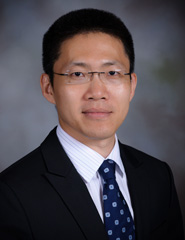Chao Wang joins ECE
August 9, 2011

Chao Wang
August 10, 2011 — Chao Wang has joined the ECE faculty as an assistant professor. He was previously a research staff member at NEC Laboratories in Princeton, NJ, where his research focused on specification and verification of complex computer systems.
Wang discussed some of his recent work on symbolic predictive analysis for concurrent programs in a talk he gave at Virginia Tech.
Parallel processing, especially on multi-core systems, is necessary to take full advantage of current hardware capabilities, he said. However, "concurrent programs are notoriously difficult to write, and a key reason for this is the behavioral complexity resulting from the large number of interleavings of concurrent components." Interleavings (areas where multiple processes interact) can cause sporadic errors that are difficult to find when writing the code.
Wang has been working on an analysis technique for runtime detection of these concurrency errors. For this technique, he first derives a symbolic predictive model. By using runtime information in addition to the source code, "this model captures not just the given traces, but all possible interleavings of events of these traces," Wang explains. Once he has collected all the information, Wang uses symbolic reasoning to check for concurrency errors.
"Although the primary focus is to reduce the verification cost," says Wang, "the predictive model and analysis techniques can be used to address other important issues, such as performance and security."
Wang received his Ph.D. from the University of Colorado at Boulder in 2004, and his M.S. and B.S. from Peking University in China. He won the Association for Computing Machinery (ACM) Outstanding Ph.D. Dissertation Award in Electronic Design Automation in 2004.
He has published more than 35 refereed journal and conference papers, and has published a book on large scale model checking. Wang was awarded the ACM Special Interest Group on Software Engineering (SIGSOFT) Distinguished Paper Award in 2010 and the Best Journal Paper of the Year Award from the ACM Transactions on Design Automation of Electronic Systems in 2008.







